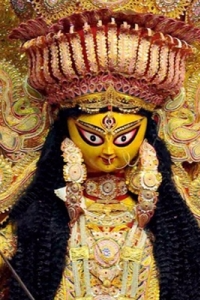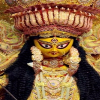
Now, strange things happen at times at most habitual moments. Like when they asked you to tell them "something about yourself" at your first job interview, and you looked blank. You did not know, until then, how difficult it could be to be asked to summarise yourself, in precise words and well-formed sentences, conclusively and sufficiently! You do not know where to start, what to carefully keep aside, what is just yours and not for the world to know, and what preciseness of the reply would fit the bill right, that is, to leave your audience engaged and pleased and to still be honest at it. When confronted with casual curiosity, or even courtesy-calls, on something so damn close to you that you've grown up to belong to it or to be it yourself, it really gets bad. I know I am getting too gibberish for you to keep on reading this piece, especially in a season where you've so much to otherwise, and I duly apologise. Give me a chance to defend.
I'm just back from a very sudden going-total-blank-at-a-most-obvious-question situation at a non-Bong gathering. They casually, only slightly curiously, had just asked me one simple well-meaning question:
"What is Durga Puja?"
It got me!
Talking of immediate reaction to it, and as you must have figured out already, yes, I went blank! I stopped short, I fell short of words.
They, hopefully, took my long silence and inward desperation for search a of word empathetically, though they would not know how difficult it is for an inside-out Bong to attempt to explain Durga Puja to them at one go, give them a ready yet satisfactory answer without fumbling at words, without soul searching deep and hard on which version, which story of Durga Puja, does she herself believe in, and which she should put across to them. How should she say it so that they get the essence, and how much not to say, knowing well that one would just not understand simply because one cannot!
How could I explain to them that, while I am a staunch atheist - one who neither believes in idol-worship nor in sporting a symbol of marriage, who does not believe that a dot or a line of vermillion on the temple, made of mercury, could help her husband live any longer – I still, happily and willingly, with all my might, love Durga Puja as if it’s a very part of myself? How can I make them realize, to feel, to trust that Durga Puja is not a matter of just religion or custom, of social or familial order, but much, much more beyond that? That it is, it is… sheer magic? How can I tell them, well enough, what Durga Puja is?
I smile back at them, still in loss, still in search of the right words, the right way…
Someone suggested:
“Bengalis wear new clothes on each day of Durga Puja, right?”
I nodded, “Yes!” I cannot tell you how, almost instantly, I went a two and twenty years back into the past… It flashed before me like a picture, how as a kid I used to get new clothes from relatives, how we – I, my brother, our cousins, neighbours, school friends – would contest on the number of clothes we’ve got, unfailingly exaggerating the number to feel better. How, a month before the Puja, my Mom used to start drawing up her shopping list and budgets much in advance and flag-up the amount to Dad every other day, with newer (and higher) quotes every time. How then, one fine day, dad won’t go to work and we not to school, and instead we’d hop into a taxi and go New Market, first shopping for the clothes with soft-drink and chicken roll breaks in between, and wrapping up in a serpentine queue before the most popular “Free School Street” Sree Leather’s shop for shoe-shopping! How, once we were home after the long day, I and my brother to put on the clothes on our very sweaty torsos, trying them out in front of the mirror, reassessing and reviewing the choice, its quality and price. How, once I started to write and also take care of my wardrobe by myself, I’d make lists behind the lined notebooks I carried to school; lists, scribbles strikethroughs and fresh notes – on what to wear on which day of the Puja and at what time – morning, evenings being of different slots for outings. And how with splitting kitchens, spreading “nuclear” germs, piling up priorities and growing so-called inconveniences, the elaborate shopping trips ahead of the Puja times first reduced to money-gifts ("Boudi, please ask Tua to buy something of her choice!") and then, eventually, to cancel-outs (You know, kids are getting old. And they have such a lot of clothes already!) Today, my little daughter, all of four years, gets her new clothes for Puja just from her closest kin, us ourselves, my parents, and my brother - albeit in multiples! Will she ever know what Puja clothes meant when I was her age…?
Before I could gather myself back to tell them all about wearing new clothes for Puja, they had already given up waiting and were already at their second guess:
"Raam ne Durga Puja kiya tha na, Raavan-vadh se pehle?"
O yes, how true! Oh, but am I not a steadfast non-believer, an atheist? But then, who cares! Didn’t I say – Durga Puja is not about religion or customs, and not about logic and rationality either! It’s magic. The magic that was created around us when my grandmother used to hum the stories to me, as I cuddled next to her under the same blanket. She spoke in a soft, slow way, almost like a chant, as she lulled me to sleep every night. That story, when Durga teasingly, playfully hid away one of the hundred-and-eight blue lotuses, Raam offered his one eye to replace the lost lotus, faced with the test of his dedication... Among the stories I have grown up with, my childhood, my very own source of magic!
But before they take another dig, I had to blurt out something. I AM the Bong, isn't it?
“You know the kind of money they spend on each community Puja… The idols later sell as art pieces at big museums… And I hear art college students these days make a decent living just out of Durga Puja productions... They just work towards these 4 days the whole year and it pays them off well enough. Singers bring out their albums, producers their movies… just on the Puja, for the Puja. In fact, the best of contemporary literature, all new writers, poets, publishers… the Puja magazines, at least a good dozen of them, are among the essentials of our Durga Puja!” – I tell them. Eyes of disbelief, I can see. Never mind! I continue, still.
“And then, to celebrate Durga Puja,” - I tell them – “the entire city of Kolkata comes to a stop on this event, for all four-to-five days. Offices, schools, everything, may be just other than emergency support functions. It’s not a religious occasion anymore, you see!”
It’s true, actually! Durga Puja, as I said, is not about worshipping and seeking blessings alone. It’s not about the belief in the Almighty, it’s not about seeking mercy or granting wishes. Durga Puja is about pandal-hopping through the nights, every night. Durga Puja is about hogging on food, all kinds of food, and all five days long. It’s about nostalgia, and about sentiments. Durga Puja is all about the spirit of it – the spirit of happiness! Ex friends re-unite, new lovers fall in love, the older ones celebrate… Durga Puja is not just a custom! Durga Puja is about life and its many meanings... It is a festival. No, wait, not even that. It’s acarnival!
Ah… I could see my audience is fidgeting, losing engagement. But I could not leave Durga Puja at this, it's criminal. So, after a hasty thought I add a new angle, hoping they’d like that some better –
“You know,” I tell now… “Raamnavami is just one of the many tales behind Durga Puja. Actually, in the Bengali sense, we think of Durga Puja more from a home-coming point of view.”
“Home-coming…?” – They ask, surprised.
“Yes, homecoming…” – I insist. I proceed to explain.
Actually, all said and done, it is really a ten days' long ritual about a married daughter coming home. Mahalaya marks the day when the father, the mighty Himalaya who’s the father of Uma (aka Durga) sets out to bring the daughter home from her in-law's, upon his wife coaxing her into bringing the daughter home, because she’s missing her, and thinks that Durga might be home-sick. Over the last five days of the ten, we celebrate the homecoming of Durga, the daughter, with her children (and pets). And then, sooner than we realize, it’s time to go back! With tears, on the day of Bijaya Dashami, she sets out on her return journey. We bid her goodbye at the Ghaat, as she slowly, very slowly, takes to the water. We wipe our eyes and come back home.
“So really, Durga Puja symbolises the annual homecoming of married daughters to their father's home.” - I thought I had just said enough and no more, when the inevitable had to come. In the shape of a most innocent query:
"And so, are you not going home?"
About the Author







Comments